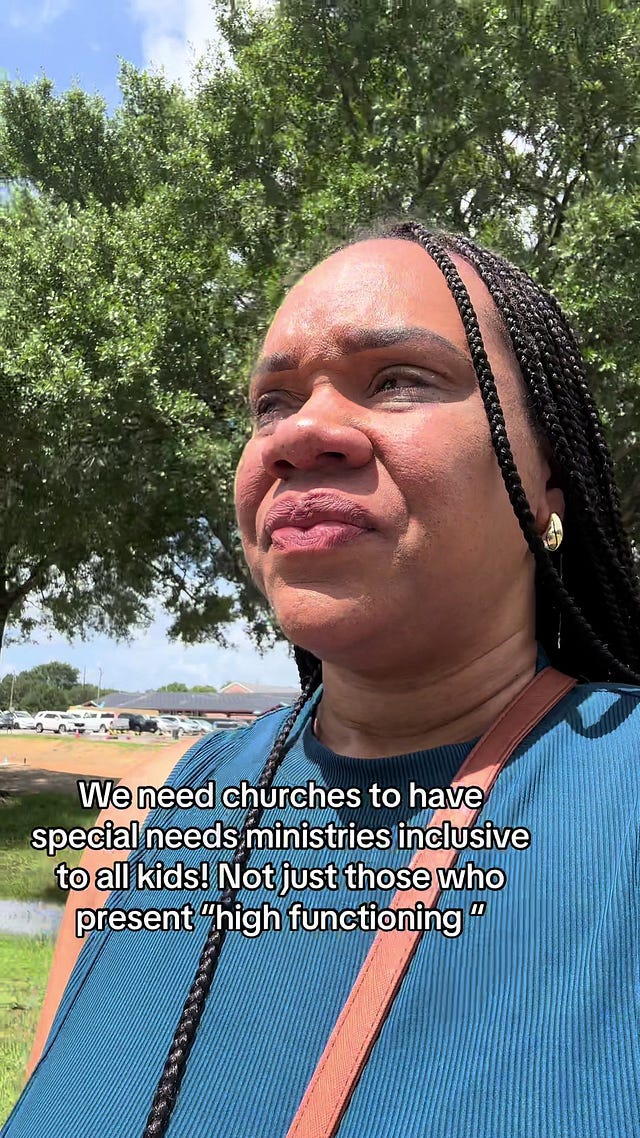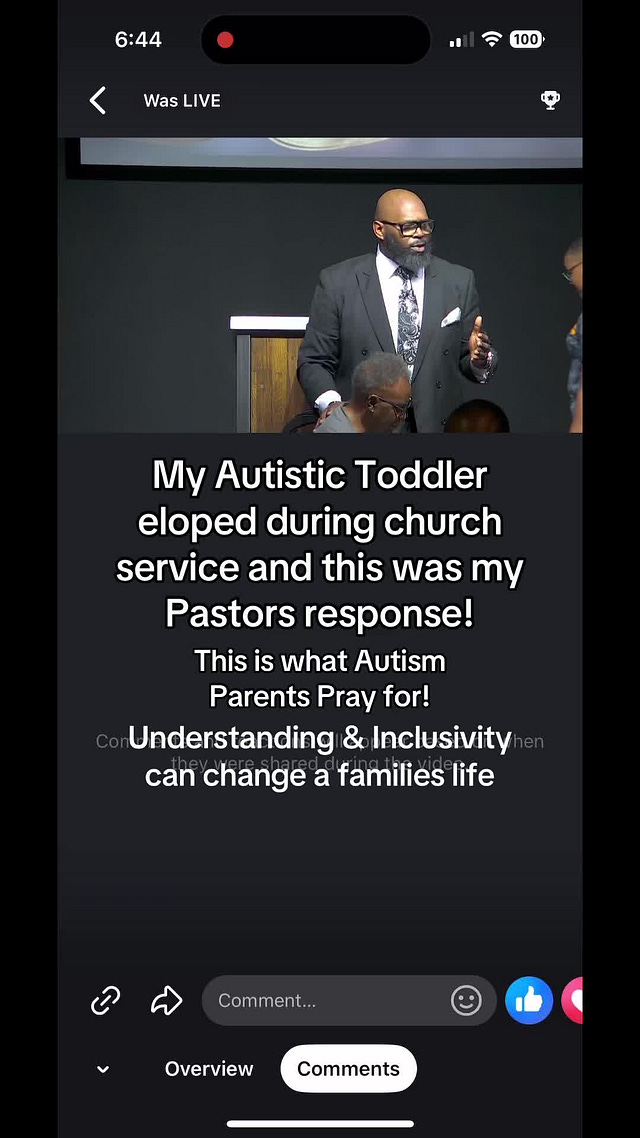Welcoming Every Mind - Worship that Celebrates Every Youth
As a music, worship and arts consultant, I offer a concept of constructing a welcoming and inclusive theological climate for youth with neurodivergence. drcandacelaughinghouse@gmail.com
I. INTRODUCTION
Jesus Welcomes All Children: A Scriptural Foundation
At the heart of our call to create a welcoming and inclusive theological climate for neurodivergent youth is the example of Jesus himself. In the Gospel of Mark, we read:
Mark 10:13–16 (NRSVUE)
13 People were bringing children to him in order that he might touch them, and the disciples spoke sternly to them. 14 But when Jesus saw this, he was indignant and said to them, “Let the children come to me; do not stop them, for it is to such as these that the kingdom of God belongs. 15 Truly I tell you, whoever does not receive the kingdom of God as a little child will never enter it.” 16 And he took them up in his arms, laid his hands on them, and blessed them.
This passage is a powerful reminder that Jesus does not turn anyone away—especially children. He welcomes them, embraces them, and blesses them, regardless of how they experience the world. Yet, for many families of neurodivergent children, church can feel like the opposite of this biblical scene.
Too often, parents are asked to leave worship services or are told their child is unwelcome in children’s church because of behaviors linked to autism, ADHD, or other neurodivergent conditions. Sometimes, children are labeled as disruptive or even a “danger” to others simply for needing to move, make noise, or process the world in a different way. These families often face exclusion and judgment, leading many to stop attending church altogether. Growing up in the Black Pentecostal church, I have witnessed people aligning these experiences as evidence that a demon was trying to enter the body of the child (or even adult).
This reminds me of a video shared by TikTok creator “momsofjoypodcast”

 Tiktok failed to load.
Tiktok failed to load.Enable 3rd party cookies or use another browser
Jesus’ response to the disciples—who spoke sternly to those bringing children—was indignation and a clear invitation: “Let the children come to me; do not stop them.” Our faith communities are called to reflect this same radical welcome, creating spaces where every child—including those with autism and other forms of neurodivergence—can come just as they are, receive blessing, and experience the love of Christ. Especially, in the times that we are living in today, the current administration has halted hundreds of millions in funding for research and is seeking to create a database of those who experience neurodivergence. Only then can we truly embody the welcoming and inclusive theological climate that honors the kingdom of God. For this purpose, the majority of the resources below are catered towards BIPOC communities of faith.
The beautiful thing is that churches are beginning to do the work. I came across this Pastor responding in the way of Christ concerning a young man in his congregation. This was shared by TikTok creator “makeitclean_mom”
And it doesn’t stop there. In May, Zion Cathedral Church of God in Christ shared this flyer that brought me so much joy….
I was unable to attend the service due to the NJ/NY traffic, but was able to offer some consulting via text to the worship leader. Below, I want to share a portion of what I offer and encourage faith communities to consider.
II. Creating a Welcoming and Inclusive Theological Climate
Central to the transformation of worship for neurodivergent children is the intentional cultivation of a welcoming and inclusive theological climate. This means more than just making practical adjustments—it means reshaping the very ethos of the church community to affirm, celebrate, and learn from the diversity of young minds.
Faith communities are increasingly recognizing the need to become more inclusive, especially for children whose brains work differently. Neurodivergent children—including those with autism, ADHD, dyslexia, and other neurodevelopmental differences—often experience traditional worship as overwhelming or inaccessible. This article provides practical tips and theological foundation for crafting worship services that genuinely welcome every child, celebrating the unique gifts each brings to the body of Christ.
Practical Tips for Neurodivergent Worship
1. Song Selection
Gentle Tempo and Predictable Structure: Choose worship songs with gentle tempos, clear melodies, and repetitive lyrics. This helps children who may be sensitive to loud or complex music.
Inclusive Participation: Encourage clapping, movement, or the use of simple instruments so children can engage at their comfort level.
Use Visual Aids: Display lyrics with images or videos to support children who learn visually.
2. Seating and Environment
Flexible Seating: Replace traditional pews with bean bags, floor cushions, or wiggle seats. Some children may prefer to stand, move around, or sit quietly in a corner.
Quiet Zones: Designate a low-stimulation area with dim lighting, weighted blankets, and noise-canceling headphones for children who need a sensory break.
3. Music and Instruments
Acoustic Instruments: Use acoustic guitars, ukuleles, or pianos for softer, more predictable sounds. These instruments are less likely to overwhelm sensitive ears.
Djembe Drums: Incorporate hand drums, such as djembes, for rhythmic and tactile engagement. Drums can provide a grounding beat and invite participation without overwhelming volume if played gently.
Music Therapy Insights: Consider instruments that are accessible, durable, and visually engaging, such as colorful percussion instruments or adaptive keyboards.
4. Sensory Supports
Fidget Toys: Pass out fidget spinners, stress balls, or textured items. These help children focus and self-regulate during worship.
Calming Aromas: Use lavender essential oils or other calming scents to create a soothing atmosphere. Biblical tradition honors the use of fragrances for spiritual and emotional well-being.
Visual Schedules: Utilize picture schedules or storyboards to outline the service, enabling children to anticipate transitions and reduce anxiety.
5. Audio Adjustments
Lower Highs, Raise Lows: Adjust the PA system to reduce harsh high frequencies and boost lower tones for a warmer, less jarring sound. This can help children with auditory sensitivities feel more comfortable.
Volume Control: Keep music and speaking volumes at a moderate level. Avoid sudden loud noises or flashing lights.
6. Theology and Language
Theology of Disability: Reference Nancy Eiesland’s The Disabled God, which reimagines Christ as a disabled God who retains his wounds after resurrection. This theology affirms that disability is not a flaw, but rather a part of God’s diverse creation.
Inclusive Language: Use words and stories that honor neurodiversity. Emphasize that every child is made in God’s image, with unique gifts and needs.
Embodied Faith: Highlight that worship is not just about listening or sitting still, but about embodied participation—movement, touch, and sensory engagement.
III. Further Resources for Faith Communities
Several resources created by Black communities are specifically designed to support and welcome neurodivergent children, particularly those navigating autism and ADHD. These resources address both the unique cultural and systemic challenges faced by Black families and offer practical, affirming guidance:
1. Black Neurodiversity Resource Lists and Organizations
Autism in Black: Founded by Maria Davis-Pierre, this organization provides parent coaching, advocacy training, and culturally competent mental health support for Black families navigating autism diagnoses and therapy. Their resources are tailored specifically for Black families and address barriers to diagnosis and care.
National Black Disability Coalition (NBDC): The NBDC focuses on the intersection of race and disability, offering advocacy, education, and community empowerment for Black individuals with disabilities, including those with autism.
2. Community and Advocacy Groups
Bounce Black: A resource hub for Black talent and holistic thriving, Bounce Black offers education, community support, events, and advocacy for young, neurodivergent Black individuals and their families.
3. Faith-Based and Community Support
Community Support Networks: Many Black faith-based groups and local community centers offer support networks for families navigating neurodivergence. These groups often provide culturally relevant resources, peer support, and training in advocacy.
Black Faith Authors on Autism and Inclusion:
Jeannine E. Dingus-Eason (Black Women Mothering Autistic Sons)
While not exclusively written from a faith perspective, A Thousand Worries: Black Women Mothering Autistic Sons (SUNY Press) by Jeannine E. Dingus-Eason features the stories of fifteen Black mothers, including the author, who navigate parenting autistic sons. The book highlights how these women leverage their faith, community, and advocacy to support their children in a society that often marginalizes Black boys with disabilities.
Dingus-Eason’s work is essential for understanding the intersections of race, gender, faith, and neurodivergence, and it provides a foundation for faith communities seeking to support Black families.
Product
Hearthsong: One of my favorite websites for products that support the wonder of a child’s mind. Many items are great for children with sensory needs not traditionally considered by most, but just a usual way of life for them.
Creating specialized worship for neurodivergent children is not just about accommodation—it’s about celebrating the full diversity of God’s creation. By adapting our spaces, music, and language, we can ensure that every child feels seen, valued, and loved. This is the heart of a truly inclusive faith community.
IV. Call to Action:
Share this article with your faith community and consider hosting a neurodivergent-friendly worship service. Together, we can create a church where every child—and every brain—feels truly welcomed and valued. Below are ways I hope to support faith communities... for me, this is also a heartfelt calling to the interfaith communities.
Establishing A Theological Climate of Welcoming All Minds
Affirmation of Neurodiversity: Root your community’s approach in the understanding that neurodiversity is part of God’s creative plan. Every child, regardless of how their brain is wired, is made in God’s image and brings unique gifts to the body of Christ.
Theology of Disability: As Nancy Eiesland suggests in The Disabled God, disability is not a problem to be solved but a reality to be embraced as part of human diversity. This theology can guide your community to see neurodivergent children not as exceptions, but as valued members of the faith family.
Decolonizing Interpretation: Drawing from scholars, I emphasize that welcoming neurodivergent youth is also about challenging traditional assumptions and power structures that have excluded or marginalized those who think or experience the world differently
Practical Expressions of Welcoming Worship
Language and Ritual: Use language in songs, prayers, and sermons that explicitly affirms all children. For example, include lyrics or readings that celebrate uniqueness, belonging, and the presence of God in every kind of mind.
Community Education: Offer workshops or discussions for the whole congregation about neurodiversity, using resources that highlight both practical tips and theological insights.
Shared Leadership: Invite neurodivergent youth and their families to help shape worship practices, ensuring that their voices and experiences are central to the community’s life. THIS IS IMPORTANT!!!!
Why This Matters
A welcoming and inclusive theological climate not only makes worship accessible but also transforms the church into a place where every child feels seen, heard, and valued. This is not just good practice—it is a living expression of the gospel’s call to love and justice.







Thank you!! This is such an amazing resource.